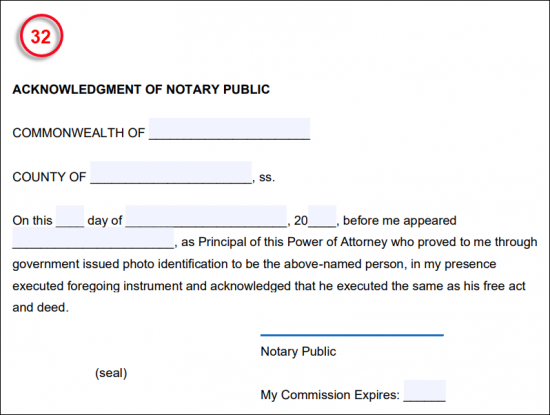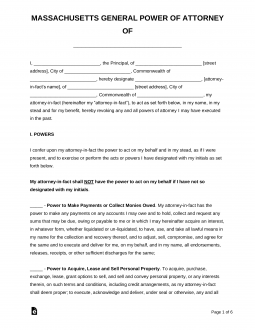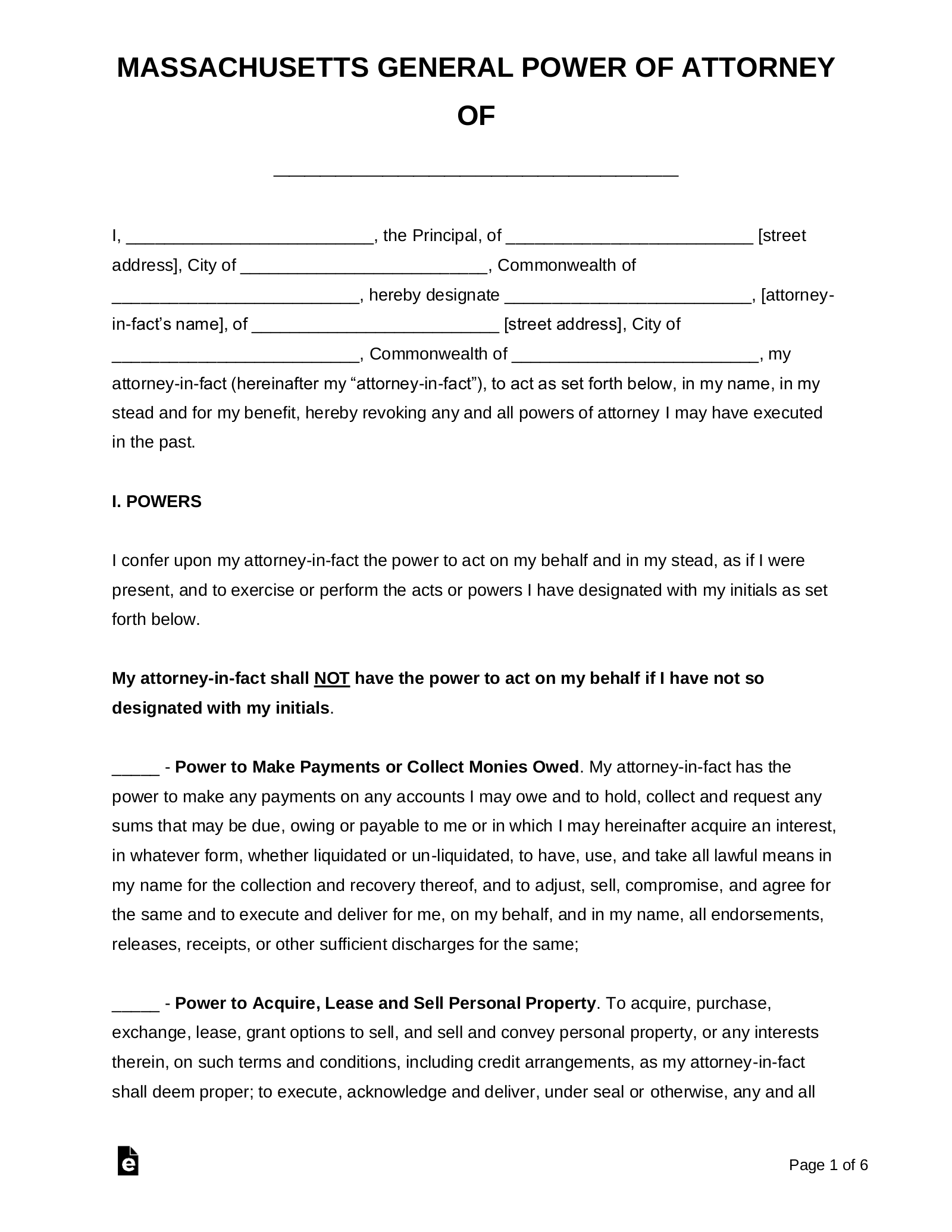Updated August 08, 2023
A Massachusetts general power of attorney is a legal form that allows a person (“principal”) to appoint someone else (“agent”) to manage their financial affairs. This is common for a principal who trusts their agent to make decisions on their behalf while they may be in another location or not interested in handling the day-to-day tasks of a business. A general power of attorney is non-durable, meaning if the principal should become incapacitated, the form would be considered null and void.
Laws
- Statutes – Chapter 190B: Massachusetts Uniform Probate Code
- Signing Requirements (M.G.L.A. 190B § 5-103) – Specific signing requirements for executing powers of attorney are not mentioned under Massachusetts law. The Principal should still seek acknowledgment from two (2) credible witnesses or a notary public in order to attest their signature. However, note that any delegation by, or at the direction of, a parent/guardian of a minor or incapacitated person must sign in the presence of two (2) witnesses of 18 years of age or older, neither of whom is the temporary agent. (Section 5-103.)
How to Write
Download: PDF, MS Word, OpenDocument
Massachusetts Declaration
(1) Principal Name. The printed name of the Principal seeking to deliver his or her authority to an Attorney-in-Fact in Massachusetts must be used to identify this document as his or her declaration both in the title and in the statement introducing this form.
(2) Principal Street Address. The building number, street, unit number, and city or county where the Principal can be reached.
(3) Principal State.
(4) Attorney-in-Fact Name. The Party who will accept the responsibility and principal authority carried by a Massachusetts Attorney-in-Fact must be named.
(5) Attorney-in-Fact Street Address.
(6) Attorney-in-Fact State.
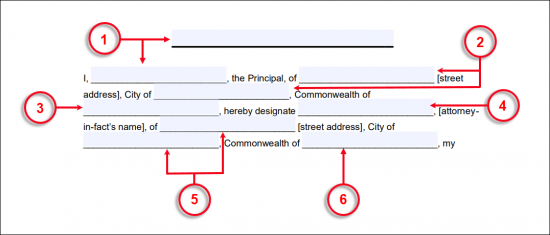
Section I. Powers
(7) Power To Make Payments Or Collect Monies Owed. Approval from the Principal is needed for the Attorney-in-Fact to be able to collect upon, negotiate, or make debts on his or her behalf. This approval can be granted to the Attorney-in-Fact with the Principal’s initials to the first power description in the list provided.
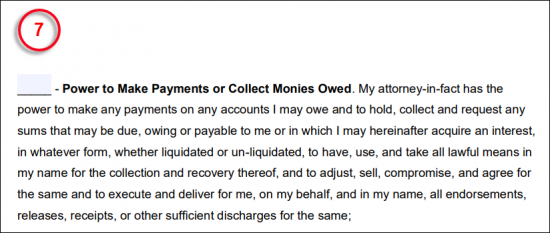
(8) Power To Acquire, Lease, And Sell Personal Property. The Attorney-in-Fact can be granted authorization to handle the Principal’s personal property in Massachusetts as if he or she were the Principal. The second power description discusses what the Attorney-in-Fact may done with the principal powers it grants upon the initials of the Principal.
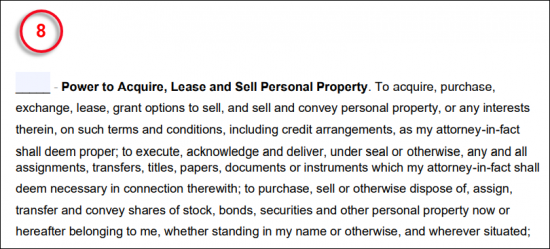
(9) Power To Acquire, Lease, And Sell Real Property. The real estate property actions the Principal can engage in or decide upon can be included to the Principal’s grant of authorization with his or her initials to the third description on this list.
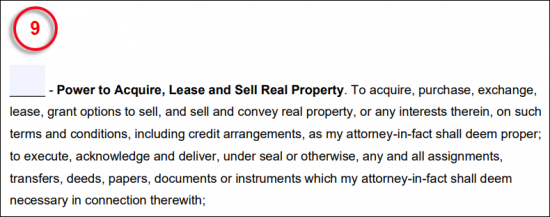
(10) Management Powers. The Principal can give the Attorney-in-Fact the ability to manage his or her real property and personal property by initialing the fourth power statement.

(11) Banking Powers. The Attorney-in-Fact will be given the authority to carry out Principal directives and actions in financial institutions (i.e., a bank) when the Principal initials the fifth statement. The Attorney-in-Fact will then be able to handle, maintain, and otherwise control the Principal’s financial accounts since it will be assumed, he or she carries the principal approval to perform such actions.
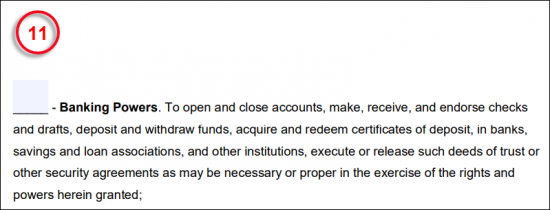
(12) Motor Vehicle. If the Principal will expect the Attorney-in-Fact to maintain his or her motor vehicles and the paperwork involved, then he or she should initial the sixth statement. Be advised that the local Massachusetts DMV may require additional paperwork for the representational powers the Principal wishes the Attorney-in-Fact to carry to be accepted.

(13) Tax Powers. The Attorney-in-Fact may be granted authority in the State of Massachusetts to access and complete income tax forms such as 1040, 1040EZ, and 1040X on behalf of the Principal along with representational powers. The IRS or concerned Entity (i.e. Department of Revenue) may require additional paperwork for the Attorney-in-Fact’s principal powers to be recognized. To include these powers in this document the Principal must initial the seventh power description.
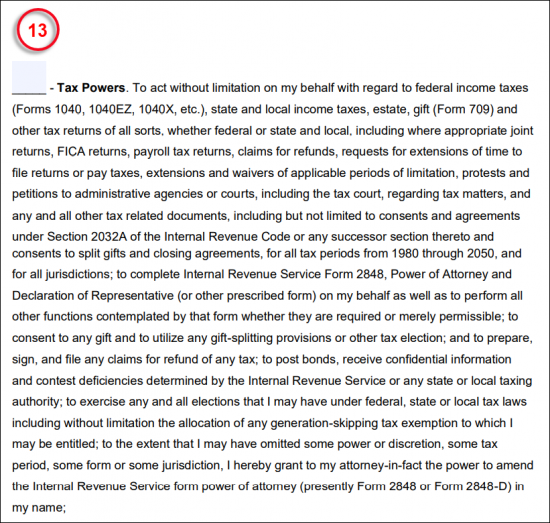
(14) Safe-Deposit Boxes. The authority to access (even by force) and control the Principal’s safe-deposit boxes can be granted to the Attorney-in-Fact through this list. To deliver such authority the Principal must approve the eighth power description by initialing it.
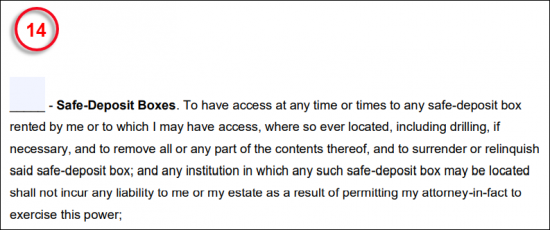
(15) Gift Making Powers. If the Attorney-in-Fact is expected to carry the same authority the Principal does when accepting or rejecting gifts or making/donating gifts then he or she must have these powers approved from this list. The Principal’s initials will need to be placed on the tenth description presented in this document’s power list.
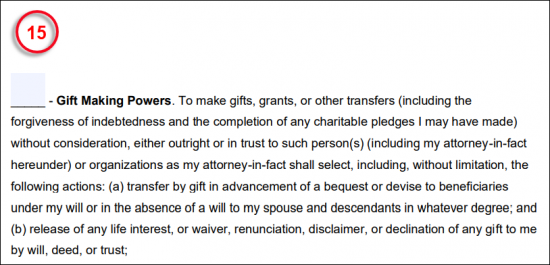
(16) Lending And Borrowing. The loan making and borrowing abilities the Principal possesses can be granted to the Attorney-in-Fact through the Principal’s initials to the eleventh item.

(17) Contracts. The Principal must initial the twelfth item of this power list to give the Attorney-in-Fact the authority to represent him or her during contract negotiations, entering the Principal in contracts, enforcement procedures, and with any other kind of action or decision needed to handle the Principal’s contractual matters.

(18) Health Care. To grant the Attorney-in-Fact similar powers as a Health Care Agent, the Principal will be required to initial the thirteenth power description.

(19) HIPAA. The Principal can approve the Attorney-in-Fact to act as his or her Health Care Representative under the Health Insurance and Accountability Act of 1996 by initialing the HIPAA item.

(20) Power To Hire And Pay For Services. Naturally, when the Attorney-in-Fact is expected to carry out Principal directives in one or more of the listed subject matters, he or she may need to hire Parties such as an Accountant or a Professional Driver as well as pay for the services provided. If the Principal intends to grant this ability to the Attorney-in-Fact, then the fourteenth power subject of this list must bear the Principal’s initials.
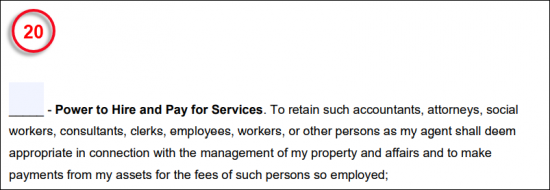
(21) Reimbursement Of Attorney-in-Fact. If the Attorney-in-Fact should be authorized to use the principal authority in this document to gain reimbursement for the (reasonable) expense incurred to perform his or her duties of carrying out the Principal’s directives, then the fifteenth list item must be initialed by the concerned Principal.

(22) Power To Sue Third Parties. At times, a Third Party that must be dealt with to carry out the principal’s directives may refuse to recognize the legal power of this document and the authorization it gives the Attorney-in-Fact to represent the Principal issuing it. The Principal may set this document to also give the Attorney-in-Fact the authorization to take court action (if needed) to force the Third Party’s compliance. This approval should be given by the Principal’s act of initialing the second to last subject on this list.
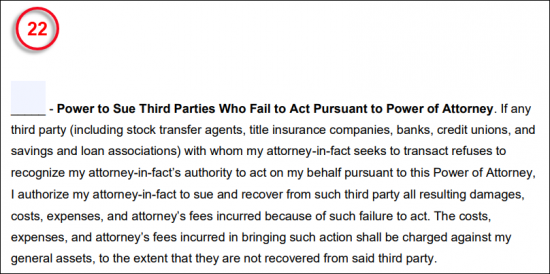
(23) Other. The Principal may have decided to slightly alter one of the above powers or to grant an additional power. If so then, the final list item provides an area where such editions or extensions may be placed and supplied with the Principal’s authorizing initials.

Section III. Effective Date And Termination
(24) Effective Date. The first day the Attorney-in-Fact can represent the Principal with the powers approved above in the State of Massachusetts can be set to be either the day this document is properly executed (signed by the Principal) or with on a specific date of the Principal’s choosing. This directive is included when the Principal initials the appropriate statement. Take note, if a specific date is desired as the start date, it must be listed.
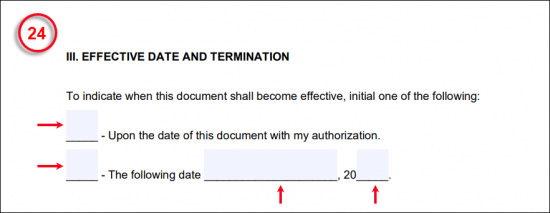
(25) Termination Date. The authorization given to the Attorney-in-Fact to utilize the authority of the Principal should be paired with a termination date or event. The Principal can choose a specific date to terminate this document, decide that no date is necessary and he or she will revoke the powers granted if and when necessary, or to have this document immediately stop being effective when he or she (the Principal) is formally diagnosed by a Physician as being incapacitated and unable to make decisions. This setting requires the Principal’s initials to be placed where appropriate and any applicable date reported.
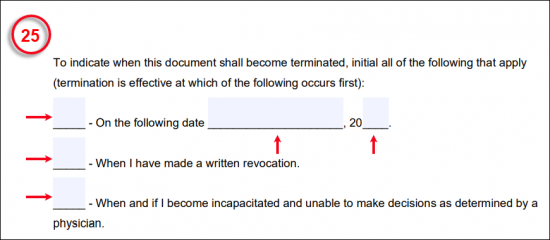
Notarized Execution
(26) Massachusetts Principal Signing Date. The signature date of this document will represent when the Principal formally approved the use of power it conveys.
(27) Principal Signature. The signature of the Principal must be supplied by the Principal on the signature date. This act is to be performed before a Notary Public for it to be considered authentic.
(28) Principal Printed Name.

Acceptance Of Appointment
(29) Attorney-in-Fact Name. The statement to be made by the Attorney-in-Fact for this paperwork only functions as an acceptance statement if it is completed with the printed name of the Attorney-in-Fact.
(30) Attorney-in-Fact Signature. The Attorney-in-Fact should show his or her acceptance of principal power by signing his or her name beneath the completed acceptance statement.
(31) Attorney-in-Fact Printed Name.
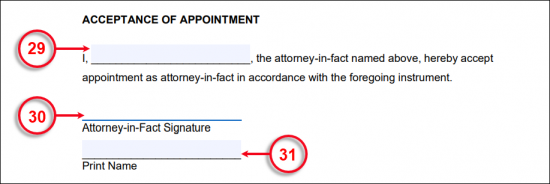
Acknowledgement Of Notary Public
(32) Massachusetts Notarization. Only a Massachusetts recognized Notary Public can authenticate the Principal’s signature with the act of notarization.
